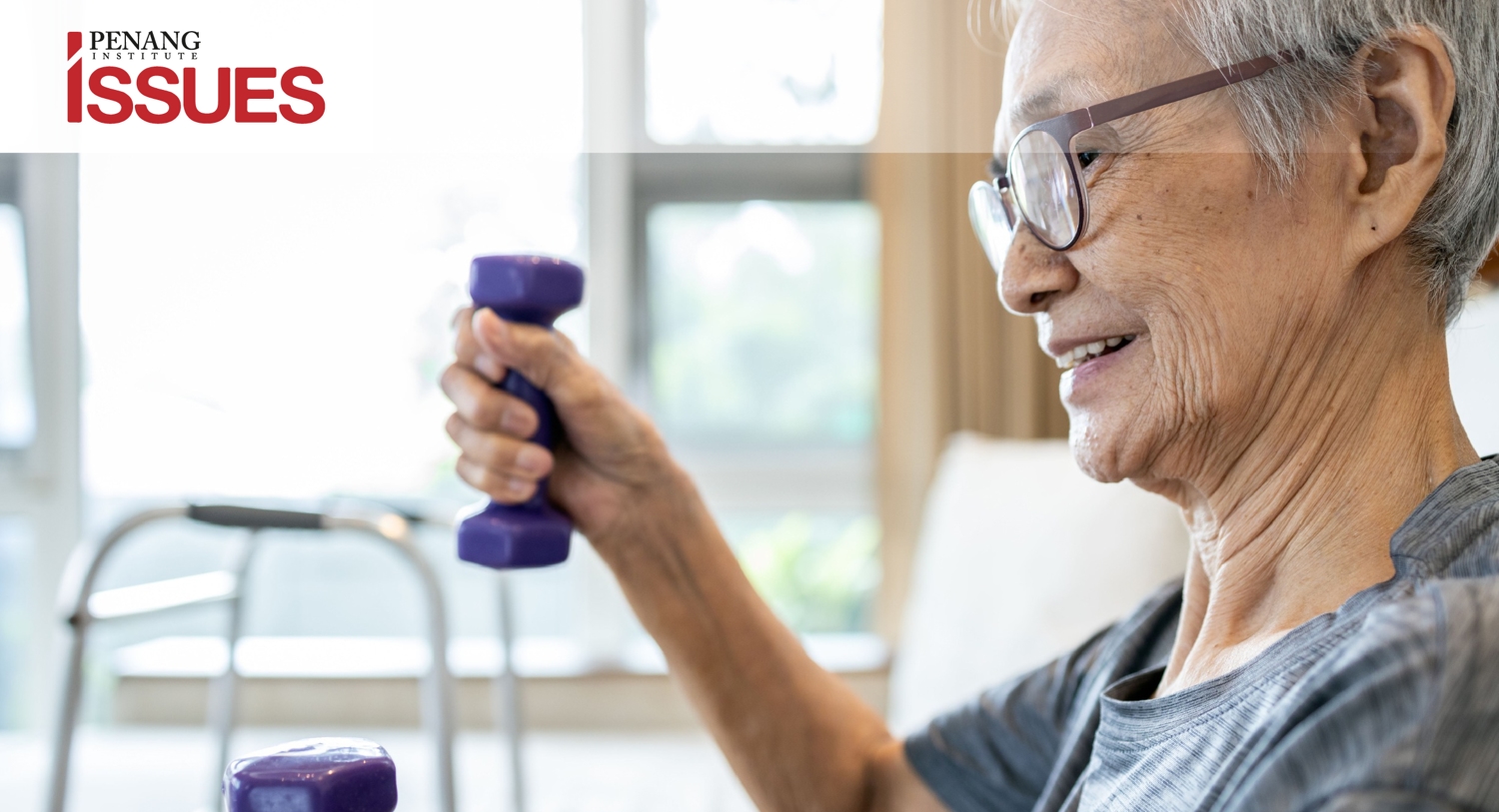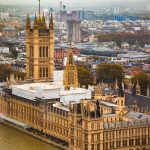EXECUTIVE SUMMARY
- Active ageing is a process whereby the opportunities for health, participation and security are enhanced to ensure a healthier life expectancy and a higher and better quality of life as society ages, with the maintenance of autonomy and independence being the key elements.
- Malaysia and Penang are both facing a rapidly ageing population and the challenges it will bring. Penang is the second fastest ageing state after Perak, and its population of those aged 60 and above is projected to be 26.2% of its total population by 2040.
- Active ageing is an important part of Penang2030’s vision, where the civic community participation of seniors and the enhancement of their quality of life is integrated within its initiatives.
- The implementation of active ageing policies and initiatives should prioritise the three components of: awareness, integration and sustainability, with corporation and collaboration from relevant state departments, state agencies and other related organisations.
- A sustainable environment for the ageing citizens in the form of enhancing elderly-friendly infrastructure, improving access to affordable healthcare, ensuring opportunities in government programs and so on needs to be created.
- It is also suggested that an institution or a committee to be established, for the purpose of addressing the issues of ageing and formulating initiatives to encourage active ageing.
Introduction
The World Health Organisation (WHO) (2014) defines active ageing as the process of optimising opportunities for health, participation and security to enhance the quality of life as people age. The word “active” refers to continuing participation in social, economic, cultural, spiritual and civic affairs, and not just the ability to be physically active or to participate in the labour force.
Active ageing aims to extend healthy life expectancy and quality of life for all people as they age, including those who are frail, disabled and in need of care. The concept of active ageing would also embody both rights and obligations, where maintaining autonomy and independence as one grows older are key elements (Walker, 2005).
According to the Malaysian Department of Statistics, Penang is the second fastest ageing state in Malaysia after Perak, where people aged 60 and above were 14.9% of its total population in 2020. Figure 1 illustrates a projection of Malaysia and Penang’s gaining population. Nationally, it is approximated that there will be a 2% increase in the percentage of senior citizens every five years, and by 2040, they are expected to stand for 19.8% of the country’s total population. However, Penang’s ageing population is estimated to rise at an even more rapid pace. By 2040, more than a quarter of Penang’s population will be aged 60 and above (26.2% of total population).

This will undoubtedly place pressure on healthcare services and increase the demand for aged care. Besides, loneliness and increased homelessness amongst the elderly are of concern. Hence, it is crucial for the state to facilitate active-ageing programmes while expanding state day-care and home nursing services.
Determinants of Active Ageing
Active ageing is dependent upon a varied array of influences, or “determinants”, which surrounds and involves the individual, families, communities and nations. Intergenerational solidarity is also an important consideration (Walker, 2015). The determinants of active aging as determined by WHO (2014) are:
i. Health and social service systems
Health systems need to maintain a life-course perspective that focuses on health promotion, disease prevention, curative services, long-term care, mental health services and equitable access to quality primary health care services.
ii. Behavioral determinants
A healthy lifestyle and active participation in one’s personal and mental wellbeing is important for all stages of life, and even more so in later life. An active physical lifestyle coupled with a healthy diet will enhance one’s quality of life in addition to preventing disease and functional decline.
iii. Determinants related to personal factors
Psychological factors such as intelligence and cognitive capacity are strong predicators of active ageing and longevity. Self-efficacy and coping styles also determine how well people adapt to life transitions, crises of ageing and personal behavioural choices.
iv. Determinants related to the physical environment
A physical environment that is age-friendly can make the difference between independence and dependence for all individuals but are of particular importance for those growing older. A safe environment and easy and equal access to open spaces will encourage community participation for older adults, and reduce the risk of isolation.
v. Determinants related to social environment
Social support, opportunities for education and lifelong learning, peace, and protection from violence and abuse are key factors in the social environment that enhance health, participation and security as people age.
vi. Economic determinants
Income, work and social protection are identified as three aspects of the economic environment that significantly affects the quality of active ageing. Active ageing policies need to intersect with a broader scheme to reduce poverty at all ages. Social protection for aging adults needs to include social insurance programmes, voluntary saving incentives and insurance programmes, in order to increase their economic independence.
Policies for the Ageing in Malaysia
1. Malaysia adopted the National Policy for the Elderly, NPE in 1995. This aims at creating a community of older persons who possess a high sense of self-worth and dignity. This is done through optimising their potential and ensuring that they profit from every opportunity available. The NPE emphasises active ageing and the need to create the right environment to improve the quality of life of older Malaysians.
2. The Malaysian Government has also set up the National Advisory and Consultative Council for the Elderly. The National Plan of Action is comprehensive and contains a proposal for action as well as programmes and activities for senior citizens. Under the policy, the National Advisory and Consultative Council for Older Persons under the chairmanship of the Minister for Women, Family, and Community Development was established in May 1996.
3. In December 1998, a Plan of Action for Older Persons was formulated. The National Policy for Older Persons defines active ageing as the process to optimise opportunities and senior citizens’ involvement in family and society. The concept ensures that the elderly continue to participate in all social, economic, cultural, spiritual and civic affairs and activities in old age. The Department of Social Welfare under the Ministry of Women, Family and Community Development is the secretariat of the council and serves as the focal point for all issues related to senior citizens.
4. In 2011, the new National Policy for Older Persons and Plan of Action for Older Persons was approved, and the plan of action was formulated. The National Plan of Action is comprehensive and contains a proposal for action as well as programmes and activities for senior citizens. A review was carried out by the government to re-look into incorporating the development and reintegration of senior citizens into society while enhancing their self-worth and dignity.
The six strategies outlined in the policy are:
- Promotion and advocacy
- Life-long learning
- Safety and security
- Governance and shared responsibilities
- Intergenerational solidarity
- Research and development
A comprehensive list of policies involving the well-being of senior citizens involving other ministries is included in Appendix A.
Active Ageing and Penang2030
In Penang, active ageing is mentioned in the Penang2030 vision as one of its initiatives in the establishment of a family-focused state.
- Theme A: Increase liveability to enhance the quality of life mentioned retaining and developing Penang’s reputation as an attractive home for the young and the old. It aims to enhance welfare and care systems by promoting active ageing and increasing the quality of care for everyone.
- Theme C: Empower people to strengthen civic participation aims to increase the participation and engagement of women, youth and seniors in the community. Under this theme, a comprehensive and sustainable active ageing policy for Penang is slated to address an ageing society, not just to improve care facilities but also to increase active and inclusive participation of seniors in their community.
Under these themes, the adoption of an active ageing policy for Penang will not just improve care facilities but also boost the participation of seniors in community life (Penang2030, 2018).
Examples of Active Ageing in Other Countries
1. Elderly Commission, Hong Kong
The Elderly Commission was established in 1997 with the duty to provide advice to the government of Hong Kong in formulating policies on elderly care, with the objective to improve the quality of life of the elderly and ensure that they are provided with security, a sense of belonging and a sense of worthiness (Hong Kong Elderly Commission, n.d.). Members of the Commission are appointed and mostly include professionals from the service providers for the elderly, academics as well as community leaders.
In addition to formulating policies on all matters relating to the elderly from the angles of care, housing, financial security, health and medical, psychological, employment and recreational needs, the Commission is also responsible for the planning and development as well as the allocation of resources for the various programmes and services for the elderly. It also undertakes the task of monitoring and evaluation and making recommendations to the government when needed (Chan & Liang, 2012).
2. The Ministerial Committee of Ageing (MCA), Singapore
In Singapore, the government places great importance in the ageing issues of its citizens. Its core ageing policies centres on ageing in place, and ensuring that there are proper mechanisms in place for residents to age well within their own communities. The three core policy themes include: preventing and managing chronic diseases, enabling sustainable intermediate and long-term care and sustaining financial security for older adults (Maholtra et. al., 2019).
The Ministerial Committee of Ageing (MCA) is placed under the Ministry of Community Development, Youth and Sports. The committee aims to bring together multiple government agencies to develop policies and action plans for handling the needs of the ageing society in a holistic manner, in addition to developing and updating the Action Plan for Successful Ageing. The Committee also places an emphasis on Active Ageing Hubs and Senior Programmes.
The government’s Senior Programmes include group exercise classes, healthy cooking classes, health workshops and social activities. At the same time, the Active Ageing Hubs are one-stop centres established specifically to serve the needs of senior citizens within the community, and are typically integrated within the HDB housing estates (Grey, n.d.). In addition to serving as an activity and interaction hub for senior citizens, Active Ageing Hubs also provide elderly-care related services such as day care, day rehabilitation and assisted living. The senior citizens are also encouraged to play an active role in organising and planning activities within the Hub, in a bid to boost cohesion and interaction among the elderly in the community.
Policy Recommendations
1. Prioritising awareness, integration and sustainability in the implementation of active ageing initiatives
It is suggested that three components be prioritised in the implementation of active ageing initiatives: awareness, integration and sustainability.
a. Awareness
Awareness and understanding about active ageing are crucial in changing mindsets away from treating the elderly as a “passive” target towards seeing them as active persons who have equal rights and opportunity to all aspects of life as they grow older, and who remain active contributors to society. The misunderstandings and discrimination regarding the ageing process and the senior citizens’ contribution to society must be corrected.
b. Integration
The integration of senior citizens’ participation in social and civic activities must be meaningful if these activities are to promote their physical and psychological wellbeing as well as their social participation and quality of life (Loke et. al., 2012). Examples of integration activities include neighbourhood active ageing projects, elderly academy schemes, volunteer social activities, intergenerational activities and life-long learning programmes, where participation allows the senior citizens to utilise their experiences and elevate their sense of worth.
c. Sustainability
Sustainability includes creating an enabling environment for elderly social engagement and civic participation. This involves establishing supportive living facilities, providing health and social security schemes, creating caregiving mutual learning and assistance with partnerships and cooperation between private and public social service agencies, district organisations, educational agencies, and state and local governments. Additionally, the needs of senior citizens who are considered vulnerable and marginalised must be managed through an all-inclusive and holistic approach.
2. Creating an enabling and sustainable environment for the elderly
With the needs of the elderly identified, the existing infrastructure and system should be modified to create an enabling and sustainable environment for them. This includes enhancing elderly-friendly infrastructure, improving access to affordable healthcare and ensuring opportunities in government programmes. Public infrastructure and facilities are under the authority of the local governments, and the Universal Design (UD) model can be fine-tuned to be more accessible and elderly-friendly.
The Gender Responsive and Participatory Budgeting (GRPB) methodology, which considers the different needs of people, including older adults, through a gender lens, will be an important tool for surveying and identifying the needs of all senior citizens from different backgrounds.
3. Establishing an institution to address the issue of ageing and formulating comprehensive plans to encourage active ageing
The Penang state government may consider establishing an institution to address the issue of ageing and to advise the government in formulating a comprehensive plan to promote and encourage active ageing. Active ageing could be institutionalised through an active ageing policy under the purview of the Social Development portfolio of the state government. This body or committee should lead the planning, implementing, monitoring, and evaluation process of the policy, while identifying key stakeholders as strategic partners of the policy.
Besides, Penang has the advantages of utilising non-profit state-funded government-linked companies to bridge the different sectors with the state and a strong civil society base to promote and integrate active ageing norms in the state. The state assemblymen or ADUN should work with the state; complimented by the local government and district offices, to identify each constituency’s demography and needs, thus working out programmes and projects according to each local context and preferences.
Conclusion
In a nutshell, active ageing is not a methodology but a concept for enabling senior citizens to enjoy their rights and for providing them with a sense of fulfillment in their life. It brings a positive impact to the state by creating a healthy and productive society while reducing caring costs for the elderly. It also addresses an issue faced by most sandwich generations where the young are trapped in the caretaking loop and the elderly face mental breakdown due to changing socio-economic status and declines in physical capacity.
Besides, while active ageing requires efforts from all layers of society, it is important to establish a core institution to oversee, monitor and control the quality of active ageing approaches and programmes carried out in the state. This will mobilise the departments, the local governments, and the GLCs and accelerate the process of cooperation between state and non-state actors. In addition to that, institutionalisation also strengthens the implementation and ensures the sustainability of active ageing in the state.
Encouraging the elderly to continually engage themselves with the community and maintain social interaction with others will enable to them to remain active both physically and mentally, and ensure for them a much healthier process of ageing.
*Note: At the time of publication, and as a result of this work, a Roadmap for Active Ageing has been launched by the Penang State Government.
For list of references and appendix, kindly download the document to view.
Editor: Ooi Kee Beng
Editorial Team: Rahida Aini, Alexander Fernandez and Nur Fitriah (Designer)
You might also like:
![The Value of Private Member’s Bills in Parliament: A Process Comparison between Malaysia and the Uni...]()
The Value of Private Member’s Bills in Parliament: A Process Comparison between Malaysia and the Uni...
![What Widens the Gender Pay Gap?]()
What Widens the Gender Pay Gap?
![The ASEAN Treaty on Extradition: Best Understood within its Political-cultural Context]()
The ASEAN Treaty on Extradition: Best Understood within its Political-cultural Context
![ESG Disclosures among Public-listed Companies Based in Penang]()
ESG Disclosures among Public-listed Companies Based in Penang
![Performance Sustained during Covid-19 Highlights Strong Fundamentals in Penang’s Trade in Goods]()
Performance Sustained during Covid-19 Highlights Strong Fundamentals in Penang’s Trade in Goods










